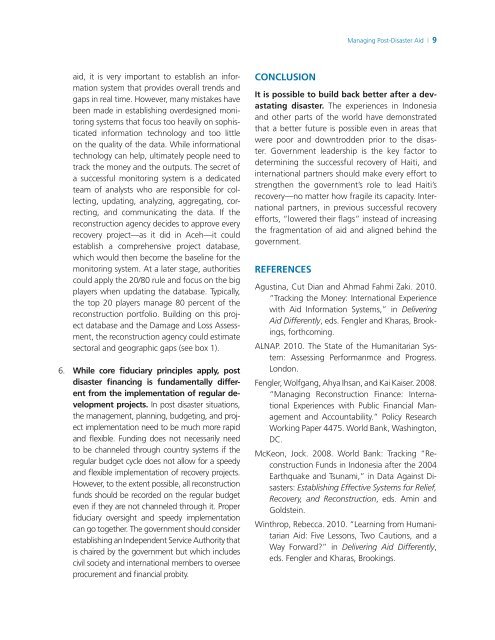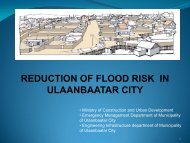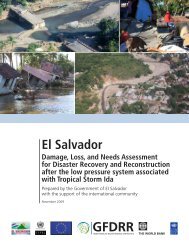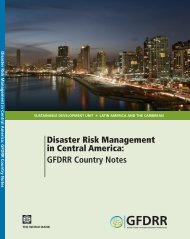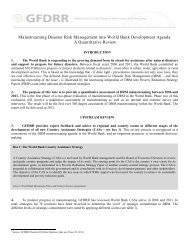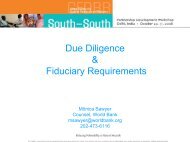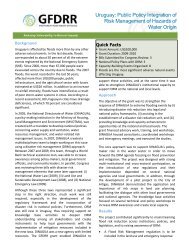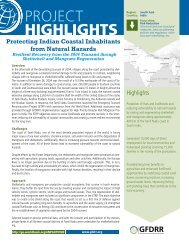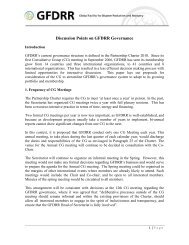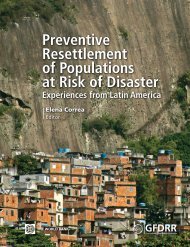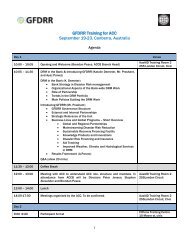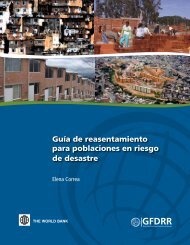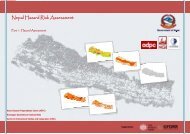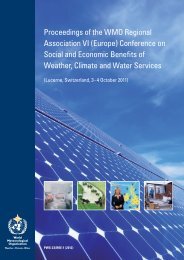Haiti Earthquake Reconstruction Knowledge Notes from ... - GFDRR
Haiti Earthquake Reconstruction Knowledge Notes from ... - GFDRR
Haiti Earthquake Reconstruction Knowledge Notes from ... - GFDRR
You also want an ePaper? Increase the reach of your titles
YUMPU automatically turns print PDFs into web optimized ePapers that Google loves.
Managing Post-Disaster Aid | 9<br />
6.<br />
aid, it is very important to establish an information<br />
system that provides overall trends and<br />
gaps in real time. However, many mistakes have<br />
been made in establishing overdesigned monitoring<br />
systems that focus too heavily on sophisticated<br />
information technology and too little<br />
on the quality of the data. While informational<br />
technology can help, ultimately people need to<br />
track the money and the outputs. The secret of<br />
a successful monitoring system is a dedicated<br />
team of analysts who are responsible for collecting,<br />
updating, analyzing, aggregating, correcting,<br />
and communicating the data. If the<br />
reconstruction agency decides to approve every<br />
recovery project—as it did in Aceh—it could<br />
establish a comprehensive project database,<br />
which would then become the baseline for the<br />
monitoring system. At a later stage, authorities<br />
could apply the 20/80 rule and focus on the big<br />
players when updating the database. Typically,<br />
the top 20 players manage 80 percent of the<br />
reconstruction portfolio. Building on this project<br />
database and the Damage and Loss Assessment,<br />
the reconstruction agency could estimate<br />
sectoral and geographic gaps (see box 1).<br />
While core fiduciary principles apply, post<br />
disaster financing is fundamentally different<br />
<strong>from</strong> the implementation of regular development<br />
projects. In post disaster situations,<br />
the management, planning, budgeting, and project<br />
implementation need to be much more rapid<br />
and flexible. Funding does not necessarily need<br />
to be channeled through country systems if the<br />
regular budget cycle does not allow for a speedy<br />
and flexible implementation of recovery projects.<br />
However, to the extent possible, all reconstruction<br />
funds should be recorded on the regular budget<br />
even if they are not channeled through it. Proper<br />
fiduciary oversight and speedy implementation<br />
can go together. The government should consider<br />
establishing an Independent Service Authority that<br />
is chaired by the government but which includes<br />
civil society and international members to oversee<br />
procurement and financial probity.<br />
CONCLUSION<br />
It is possible to build back better after a devastating<br />
disaster. The experiences in Indonesia<br />
and other parts of the world have demonstrated<br />
that a better future is possible even in areas that<br />
were poor and downtrodden prior to the disaster.<br />
Government leadership is the key factor to<br />
determining the successful recovery of <strong>Haiti</strong>, and<br />
international partners should make every effort to<br />
strengthen the government’s role to lead <strong>Haiti</strong>’s<br />
recovery—no matter how fragile its capacity. International<br />
partners, in previous successful recovery<br />
efforts, “lowered their flags” instead of increasing<br />
the fragmentation of aid and aligned behind the<br />
government.<br />
REFERENCES<br />
Agustina, Cut Dian and Ahmad Fahmi Zaki. 2010.<br />
“Tracking the Money: International Experience<br />
with Aid Information Systems,” in Delivering<br />
Aid Differently, eds. Fengler and Kharas, Brookings,<br />
forthcoming.<br />
ALNAP. 2010. The State of the Humanitarian System:<br />
Assessing Performanmce and Progress.<br />
London.<br />
Fengler, Wolfgang, Ahya Ihsan, and Kai Kaiser. 2008.<br />
“Managing <strong>Reconstruction</strong> Finance: International<br />
Experiences with Public Financial Management<br />
and Accountability.” Policy Research<br />
Working Paper 4475. World Bank, Washington,<br />
DC.<br />
McKeon, Jock. 2008. World Bank: Tracking “<strong>Reconstruction</strong><br />
Funds in Indonesia after the 2004<br />
<strong>Earthquake</strong> and Tsunami,” in Data Against Disasters:<br />
Establishing Effective Systems for Relief,<br />
Recovery, and <strong>Reconstruction</strong>, eds. Amin and<br />
Goldstein.<br />
Winthrop, Rebecca. 2010. “Learning <strong>from</strong> Humanitarian<br />
Aid: Five Lessons, Two Cautions, and a<br />
Way Forward?” in Delivering Aid Differently,<br />
eds. Fengler and Kharas, Brookings.


